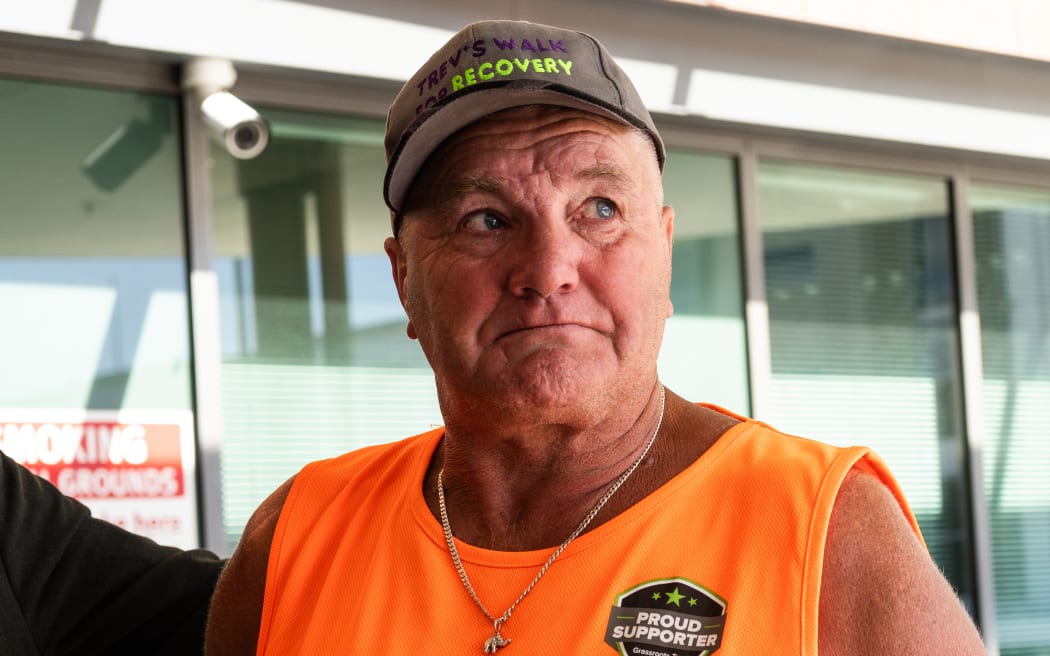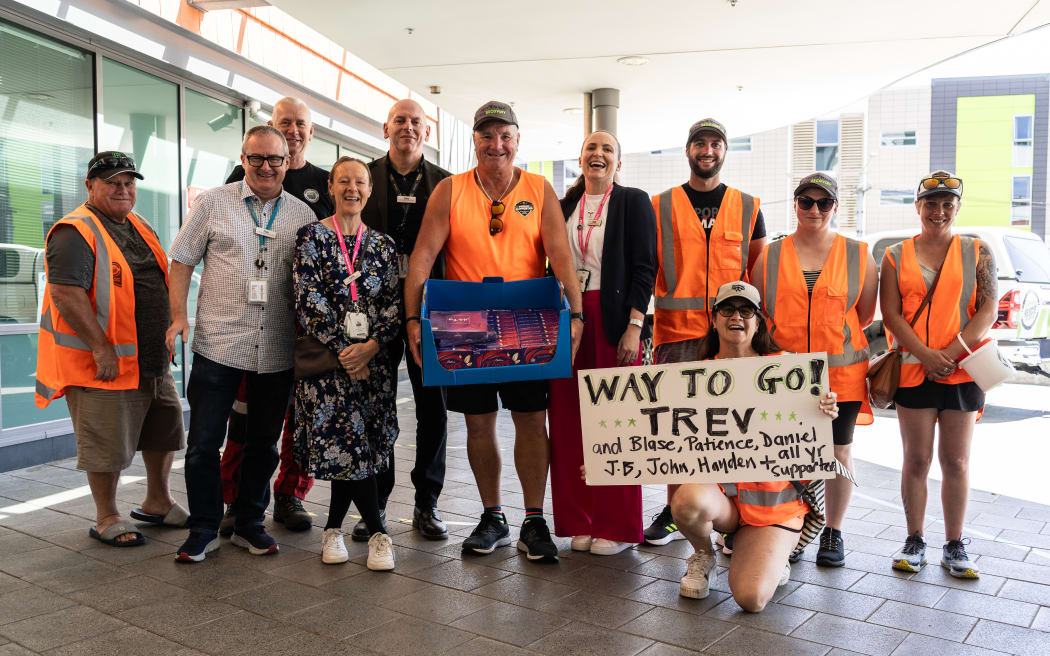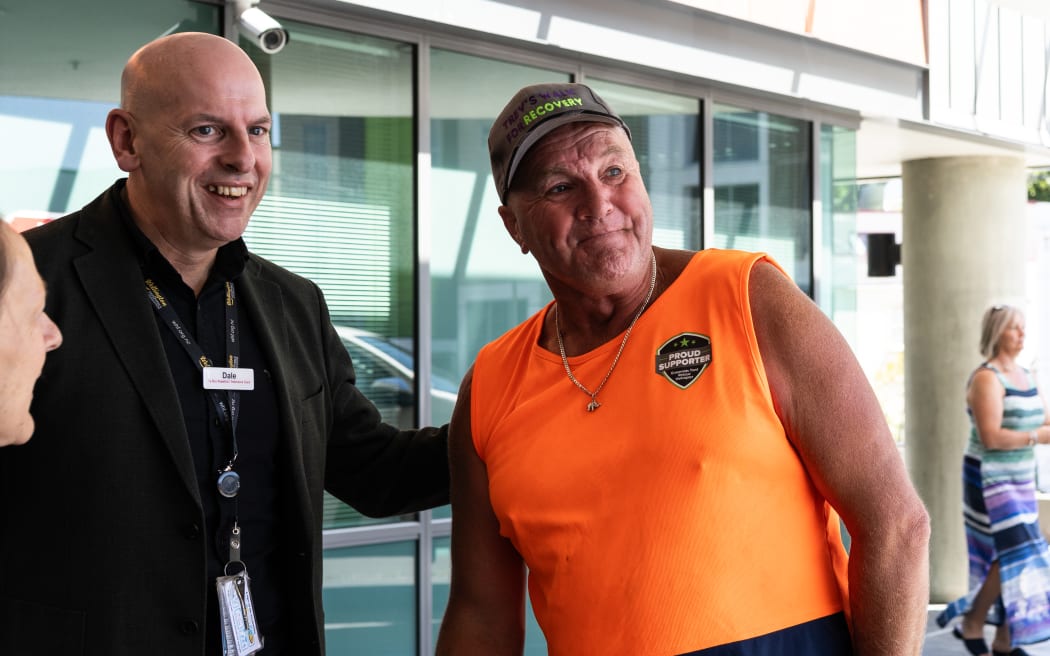
Trevor Moore was emotional as he finished his six-day trek. Photo: RNZ / Kate Judson
A Dannevirke man has completed a fundraising walk from his hometown to Wellington Hospital just six months after suffering horrific injuries when cutting down a tree in the rural back blocks.
In less than a week, 62-year-old Trevor Moore has covered 270 kilometres to raise money for the rescue helicopter that saved his life.
On Thursday afternoon, after six days of walking, Moore arrived at the hospital to say an emotional thank you to staff.
"What I wanted to do was to hopefully raise enough funds to cover my rescue as my way of giving back, and we exceeded that," Moore said.
"I set a goal of $15,000. I think we're at $27,000."
That's all to be donated to Palmerston North's Grassroots Trust Rescue Helicopter, which rushed Moore from a remote part of the Tararua District to Wellington Hospital on 31 May.
Moore cannot remember the incident, but has previously told RNZ the result: "My skull was split, exposing my brain. I was leaking brain fluid from my head and my nose and I broke every bone in my face - both eye sockets."
During his walk, he collected donations, as well as fundraising online.
"When I was in ICU [the intensive care unit] I was told the only reason I was alive was because of my heart. I've got a good heart and I take that two ways.
"Yes, I've got a good strong heart, a healthy heart, and I've got a heart that wants to give," Moore said on Thursday.

Trevor Moore and his support team as he arrives at Wellington Hospital. Photo: RNZ / Kate Judson
Moore has a bad knee from a fall on his property a few years ago. It required a cortisone injection on his walk.
He was clipped by a camper van at one point, and he still suffers headaches and blurred vision from his accident in May.
But he never thought of giving up.
"Every car that goes past and toots, that lets me know that I've got someone there. I've had people stop in the middle of the road, wind their window down and give us money, saying, 'good on you'.
"I've had people with children come out of their cars and give us money."
For much of the way, Moore's dog Blaze kept him company.
His son, Daniel, was there too.
"I've been with my father since day one. I've matched him step to step, kept him going. He's kept me going," Daniel said.
"Six months ago I did not think he would be able to do this. I was worried [about whether] he'd be able to get up out of bed and go to the bathroom by himself, and now he's walking 50km a day unassisted."

Wellington ICU nurses manager Dale Imray reunites with former patient Trevor Moore. Photo: RNZ / Kate Judson
Moore has had plenty of help along the way, including from Wellington ICU staff.
Nurses manager Dale Imray and doctor Kate Tietjens were among the well-wishers greeting Moore on arrival in Wellington.
They said it was remarkable seeing what he had done so soon after his brush with death.
"To see him come back after this period of time and how great he is, is actually really inspiring. We don't often get that. It's really lovely, actually," Tietjens said.
Helicopter base manager Graeme Spiers was one of the crew who flew to Moore when he was injured, and was also in Wellington on Thursday.
"We arrived on the scene before any other emergency service. It epitomises the value of rescue helicopters in those rural communities. We were 14 minutes airborne to get to Trev. An ambulance was probably an hour or an hour and a half away.
"Likewise, the flight from where Trev was hurt - 45 minutes to Wellington Hospital. It would have taken more like four hours in an ambulance."
Moore's fundraising effort made a huge contribution to the service, and he had more than covered the about $12,000 it would have cost for the flights on 31 May, Spiers said.
"He was certainly in a pretty bad way when we arrived on the scene," he said.
"We landed on a wet and muddy track, had to get down to him to access him, recover him back to the aircraft and then provide some lifesaving equipment for him to get him to Wellington.
"To see him as he is today and to see the effort he's been able to put together in fundraising six or seven months from his injury is unbelievable."
Moore said nobody initially held much hope for his survival, and after he woke from a coma he was in a dark place.
But, a couple of weeks into his recovery, something changed. Not long after the idea of the walk came to him.
Now, Moore said, people were telling him that he was inspiring them.

